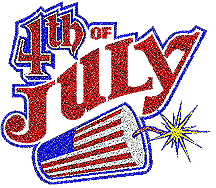Summertime:
the smell of the barbecue,
the roar of holiday crowds
at events throughout the land,
family, picnics and the beach.
It's America's annual birthday party
and everyone is invited.
the smell of the barbecue,
the roar of holiday crowds
at events throughout the land,
family, picnics and the beach.
It's America's annual birthday party
and everyone is invited.

2015
Schoolchildren in America learn the basic history of the events surrounding the Fourth of July,
but the details of this monumental occasion in American history somehow fall through the cracks.
Although July 4th is celebrated as America’s official split from Britain’s rule
and the beginning of the American Revolution,
the actual series of events show that the process took far longer than a single day.
The original resolution was introduced by Richard Henry Lee of Virginia on June 7, 1776,
and called for the Continental Congress to declare the United States free from British rule.
Three days later
a committee headed by Thomas Jefferson was appointed to prepare an appropriate writing for the occasion.
The document that we know as the Declaration of Independence was adopted by Congress on July 4th
although the resolution that led to the writing of the Declaration was actually approved two days earlier.
All of this had occurred with some of the delegates to the Congress not even present;
New York, for example, did not even vote on the resolution until July 9th.
Even more interesting is the fact that not a single signature was appended to the Declaration on July 4th.
While most of the fifty-six names were in place by early August,
one signer, Thomas McKean, did not actually sign the Declaration until 1781.
Nevertheless,
July 4th was the day singled out to mark the event of the United States establishing itself as a nation.
Only four American holidays are still celebrated on their proper calendar days:
Halloween, Christmas, New Year’s and Independence Day.
Of all the secular holidays,
the Fourth of July is the only one whose celebration date resists change.
Even in more provincial times,
suggestions to alter the day of the festival
to the preceding Saturday or the following Monday when July 4th fell on Sunday
were protested
The feeling about the sanctity of America's Independence Day was best expressed
in a quotation from the Virginia Gazette on July 19th, 1777:
"Thus may the 4th of July, that glorious and ever memorable day,
be celebrated through America,
by the sons of freedom,
from age to age
till time shall be no more.
Amen and Amen."
but the details of this monumental occasion in American history somehow fall through the cracks.
Although July 4th is celebrated as America’s official split from Britain’s rule
and the beginning of the American Revolution,
the actual series of events show that the process took far longer than a single day.
The original resolution was introduced by Richard Henry Lee of Virginia on June 7, 1776,
and called for the Continental Congress to declare the United States free from British rule.
Three days later
a committee headed by Thomas Jefferson was appointed to prepare an appropriate writing for the occasion.
The document that we know as the Declaration of Independence was adopted by Congress on July 4th
although the resolution that led to the writing of the Declaration was actually approved two days earlier.
All of this had occurred with some of the delegates to the Congress not even present;
New York, for example, did not even vote on the resolution until July 9th.
Even more interesting is the fact that not a single signature was appended to the Declaration on July 4th.
While most of the fifty-six names were in place by early August,
one signer, Thomas McKean, did not actually sign the Declaration until 1781.
Nevertheless,
July 4th was the day singled out to mark the event of the United States establishing itself as a nation.
Only four American holidays are still celebrated on their proper calendar days:
Halloween, Christmas, New Year’s and Independence Day.
Of all the secular holidays,
the Fourth of July is the only one whose celebration date resists change.
Even in more provincial times,
suggestions to alter the day of the festival
to the preceding Saturday or the following Monday when July 4th fell on Sunday
were protested
The feeling about the sanctity of America's Independence Day was best expressed
in a quotation from the Virginia Gazette on July 19th, 1777:
"Thus may the 4th of July, that glorious and ever memorable day,
be celebrated through America,
by the sons of freedom,
from age to age
till time shall be no more.
Amen and Amen."
Independence Day at Wilstar.com

